The Vital Importance of Shark Conservation Efforts in Ocean Ecosystems
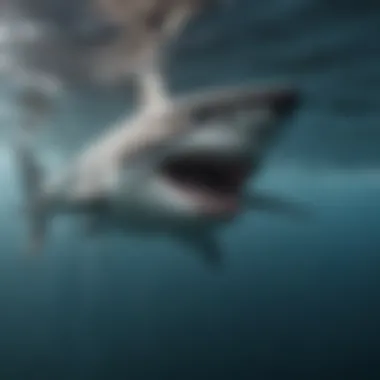
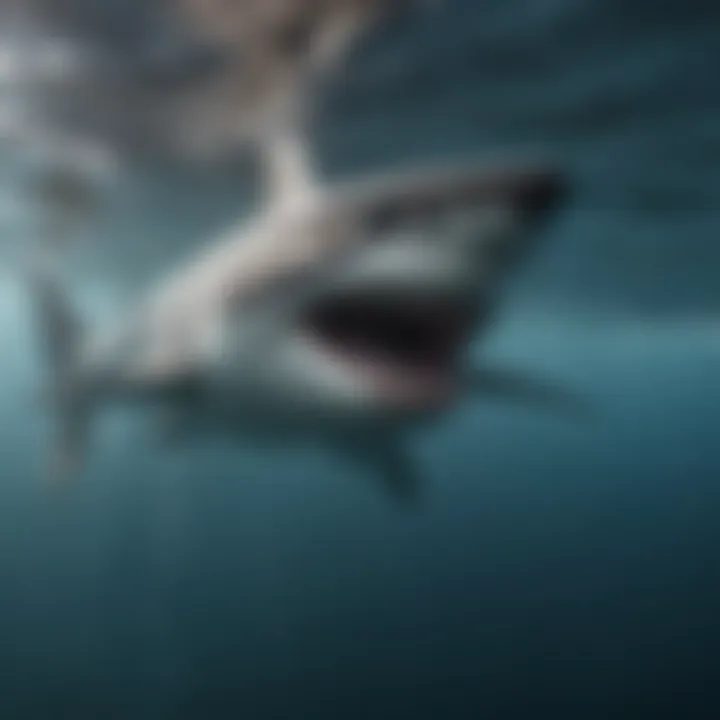
Equipment and Gear
Sharks, as apex predators in our oceans, possess unique characteristics that require specific strategies for conservation. To protect these magnificent creatures effectively, it is essential to understand the importance of utilizing appropriate equipment and gear. While in the realm of shark conservation, gear does not refer to physical tools, the metaphorical 'gear' encompasses scientific instrumentation, research vessels, and technology necessary for studying shark populations and ecosystems. This section aims to delve into the critical role equipment plays in conducting research, implementing conservation strategies, and monitoring the well-being of sharks in their natural habitat.
Techniques and Training
Conserving sharks goes beyond just understanding their habitat; it requires a deep understanding of the specific techniques and training needed to support their populations. Techniques in shark conservation involve methods such as tagging and tracking to study their migratory patterns, behavior, and population dynamics. Furthermore, training individuals in the field of marine biology and conservation biology equips them with the knowledge and skills needed to conduct research, analyze data, and implement conservation measures effectively. This section will explore the intricate techniques and specialized training essential for safeguarding shark species worldwide.
Safety and Risk Management
In the realm of shark conservation, safety and risk management play a crucial role not only for researchers but also for the sharks themselves. Understanding the potential risks involved in studying these apex predators is vital to ensure the well-being of both humans and sharks in their shared environment. This section will provide insights into safety protocols, risk assessment strategies, and emergency response plans necessary for conducting research, conservation efforts, and raising awareness about the importance of shark protection without compromising human safety.
Events and Competitions
While the concept of events and competitions may seem juxtaposed with shark conservation, they are instrumental in generating interest, raising awareness, and fostering a sense of community around the topic. Shark-themed events, festivals, and educational competitions provide a platform for enthusiasts, researchers, and conservationists to come together, share knowledge, and celebrate the beauty and significance of these animals. This section aims to showcase upcoming events, competitions, and initiatives that contribute to the preservation of sharks and their valuable role in maintaining marine ecosystems.
Lifestyle and Community
Shark conservation extends beyond the scientific realm; it encompasses a lifestyle centered around appreciation, respect, and sustainable coexistence with these majestic creatures. Cultivating a community dedicated to shark conservation involves fostering a culture of environmental stewardship, ethical practices, and advocacy for policy changes that benefit shark populations. From eco-friendly diving practices to supporting local shark sanctuaries, this section will explore the broader lifestyle and communal aspects of engaging with sharks, promoting responsible tourism, and advocating for their protection.
Introduction
Sharks are fundamental to ocean ecosystems, serving as apex predators with a crucial role in maintaining balance. Understanding the significance of shark conservation is paramount due to their integral position in the marine food chain. This part of the article will delve into the various facets of why safeguarding sharks is essential for the health of our oceans. From exploring their unique characteristics to delving into the threats they face, this section sets the stage for a comprehensive discussion on the importance of shark conservation.
Understanding Sharks as Apex Predators
Sharks' Role in Marine Ecosystems
Sharks act as regulators in marine ecosystems, controlling the population of other species and preventing overgrazing of marine vegetation. Their presence ensures that the ecosystem remains in balance, exhibiting a crucial ecological role that cannot be overlooked. The unique ability of sharks to maintain biodiversity by regulating prey populations makes them indispensable in ocean conservation efforts.
Unique Characteristics of Sharks
Sharks possess remarkable sensory abilities, enabling them to detect prey from long distances. This heightened sense of smell and electroreception sets them apart as efficient hunters. However, their slow reproductive rate makes them particularly vulnerable to exploitation. Understanding these unique traits sheds light on why sharks are both fascinating and in need of protection for the sustenance of marine ecosystems.
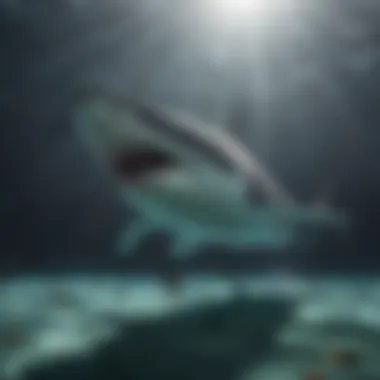
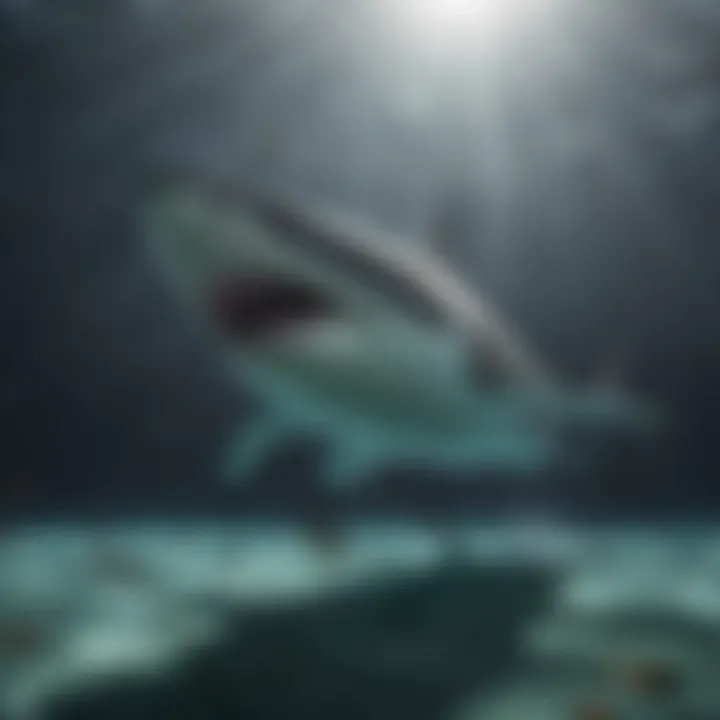
Threats Facing Shark Populations
Overfishing and Bycatch
Overfishing poses a significant threat to shark populations, leading to declines in their numbers. Bycatch, the unintentional capture of sharks in fishing gear targeting other species, further exacerbates this issue, contributing to the decline of shark populations worldwide. Addressing these threats is essential to prevent the depletion of shark species.
Illegal Shark Finning
Illegal shark finning involves the cruel practice of cutting off shark fins for delicacies like shark fin soup. This inhumane practice not only threatens shark populations but also disrupts marine ecosystems by destabilizing food chains. By discussing the detrimental impact of illegal shark finning, we can raise awareness about the urgent need to combat this unsustainable practice.
Habitat Destruction
Habitat degradation, including coral reef destruction and marine pollution, directly impacts shark habitats. The loss of essential breeding and feeding grounds hinders the ability of shark populations to thrive. Recognizing the consequences of habitat destruction is vital to implementing conservation measures that protect shark habitats and ensure their long-term survival.
Importance of Shark Conservation
Preserving Biodiversity
Preserving shark populations is essential for safeguarding biodiversity in the oceans. As apex predators, sharks play a key role in maintaining the health of marine ecosystems by regulating prey populations. The preservation of biodiversity through shark conservation efforts contributes to the overall resilience of ocean ecosystems.
Maintaining Ecosystem Balance
By maintaining a balance in marine ecosystems, sharks prevent the overconsumption of certain species and promote species diversity. This equilibrium is essential for the sustainability of ocean environments, highlighting the critical importance of preserving shark populations for the long-term health of marine ecosystems.
Economic and Ecological Value of Sharks
The economic value of sharks extends beyond fisheries, with ecotourism opportunities centered around shark encounters contributing significantly to local economies. Additionally, the ecological value of sharks in maintaining healthy oceans is immeasurable, as their presence ensures the stability of marine food webs. Recognizing the dual economic and ecological significance of sharks underscores the need for enhanced conservation efforts to protect these vital predators.
This section of the article provides a comprehensive exploration of the threats facing shark populations and the critical importance of conservation efforts in safeguarding these apex predators for the future of our oceans.
Global Conservation Efforts
Global Conservation Efforts play a pivotal role in safeguarding shark populations and preserving marine ecosystems. By coordinating international agreements and policies, countries work together to address widespread threats facing sharks. These efforts are instrumental in maintaining biodiversity and ecosystem balance, ensuring the long-term sustainability of shark species. Scientific research and monitoring complement these conservation initiatives, providing crucial data on shark populations and their behaviors.
International Agreements and Policies

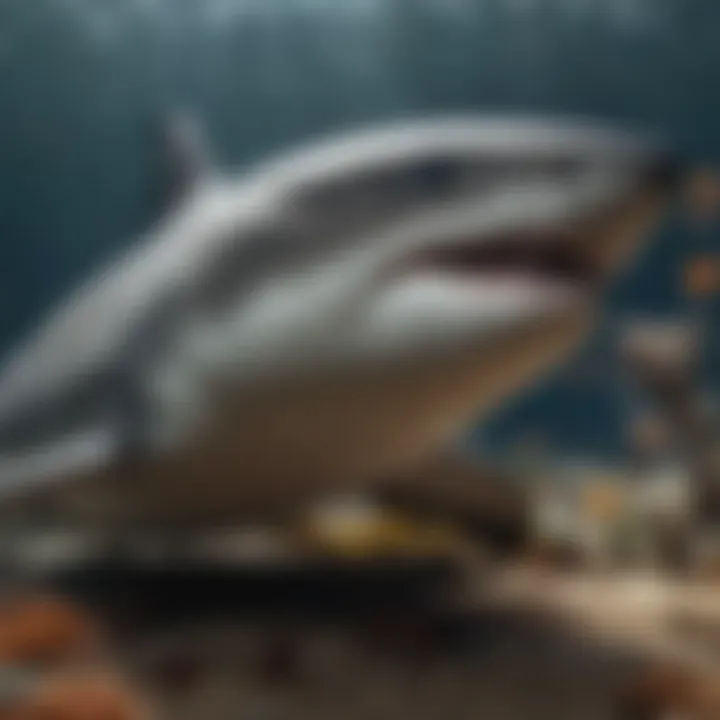
CITES and Shark Protection
CITES, the Convention on International Trade in Endangered Species of Wild Fauna and Flora, is a key international agreement that regulates the trade of endangered species, including certain species of sharks. Under CITES, species listed under Appendix II require permits to ensure that their trade does not threaten their survival in the wild. This measure helps in curbing overexploitation and illegal trade of shark products, contributing significantly to shark conservation efforts globally. While CITES provides essential protection for vulnerable shark species, challenges such as enforcement and compliance require ongoing attention to enhance its effectiveness.
Regional Shark Conservation Plans
Regional Shark Conservation Plans are tailored strategies designed by specific geographic regions to address the needs of local shark populations. These plans take into account the unique characteristics and threats faced by sharks in different regions, allowing for targeted conservation efforts. By focusing on regional dynamics, these plans enhance the conservation impact and provide a framework for coordinated action among countries sharing common shark habitats. However, effective implementation and enforcement of these plans remain crucial for their success, as varying levels of commitment and capacity among nations can affect their outcomes.
Marine Protected Areas for Sharks
Benefits of Marine Reserves
Marine Protected Areas (MPAs) offer critical sanctuaries for sharks by restricting human activities that can harm their populations. These protected zones allow sharks to thrive without the pressure of fishing or habitat destruction, contributing to their conservation. MPAs not only safeguard shark species but also play a significant role in supporting ecosystem functions and maintaining biodiversity. By designating specific areas for shark protection, MPAs help in preserving the delicate balance of marine ecosystems and ensuring the resilience of shark populations in the face of growing threats.
Challenges in Enforcement
While the benefits of MPAs for shark conservation are evident, challenges in enforcement present significant obstacles. Illegal fishing activities, lack of resources, and inadequate monitoring can compromise the effectiveness of MPAs in protecting sharks. Enforcing boundaries, regulating human interactions, and combating illegal practices within MPAs require robust surveillance and governance mechanisms. Overcoming these enforcement challenges is essential to maximize the conservation impact of Marine Protected Areas and secure a sustainable future for sharks.
Scientific Research and Monitoring
Tracking Shark Populations
Tracking Shark Populations is essential for understanding population trends, migration patterns, and distribution of shark species. By gathering data on population sizes and movements, researchers can assess the health of shark populations and identify areas that require conservation attention. Tracking initiatives provide valuable insights into the impact of conservation measures and help in evaluating the effectiveness of existing protection strategies. Moreover, long-term tracking enables scientists to monitor changes in shark behavior and population dynamics, guiding targeted conservation efforts for vulnerable species.
Studying Behavior and Migration Patterns
Studying Behavior and Migration Patterns offers detailed insights into the ecology and biology of sharks, shedding light on their interactions with the marine environment. Understanding behavior patterns, feeding habits, and migration routes helps in formulating comprehensive conservation plans that address the specific needs of different shark species. By unraveling the mysteries of shark behavior, researchers can develop strategies to mitigate human-shark conflicts, protect critical habitats, and promote coexistence between sharks and coastal communities. Studying behavior and migration patterns is integral to enhancing our knowledge of shark ecology and formulating effective conservation strategies for these iconic marine predators.
Community Involvement and Education
Community involvement and education play a pivotal role in the conservation of sharks. By engaging local communities, we can promote awareness and cultivate a sense of responsibility towards protecting these apex predators and the marine ecosystems they inhabit. Local communities are essential stakeholders in shark conservation efforts, as they often interact directly with these creatures and their habitats. Through education and involvement, we can empower these communities to take active roles in sustainable practices and conservation initiatives.
Engaging Local Communities
Promoting Sustainable Fishing Practices


Promoting sustainable fishing practices is a critical aspect of shark conservation. By encouraging communities to adopt sustainable fishing methods, we can reduce the negative impact on shark populations and marine biodiversity. Sustainable fishing practices involve techniques that prioritize the long-term health of marine ecosystems while minimizing harm to non-target species, including sharks. These practices aim to ensure the responsible harvesting of marine resources without compromising the ecosystem's balance and integrity.
Raising Awareness on Shark Conservation
Raising awareness on shark conservation is key to garnering support for conservation efforts. By educating the public about the importance of sharks in marine ecosystems and the threats they face, we can foster a greater appreciation for these apex predators. Raising awareness can lead to increased advocacy for policies that protect sharks and their habitats while promoting sustainable practices in fishing and marine activities.
Educational Programs and Outreach
School Initiatives
School initiatives are instrumental in instilling environmental stewardship in the younger generation. By incorporating shark conservation education into school curricula, we can nurture a generation of environmentally conscious individuals who understand the significance of biodiversity and ecosystem conservation. School initiatives provide students with valuable knowledge about sharks and their role in maintaining ecological balance, inspiring them to become advocates for marine conservation.
Public Campaigns
Public campaigns serve as powerful tools for spreading awareness and promoting behavioral change. By organizing public campaigns focused on shark conservation, we can reach a broader audience and mobilize support for conservation initiatives. These campaigns can utilize various media channels to deliver messages about the importance of shark conservation, encouraging individuals to adopt sustainable practices and contribute to efforts aimed at protecting sharks and their habitats.
Challenges and Future Perspectives
In the realm of shark conservation, examining the challenges and future perspectives is imperative for ensuring the longevity of these apex predators and the marine ecosystems they inhabit. Understanding the intricacies of illegal shark trade sheds light on the hurdles faced in protecting these majestic creatures. Resolving issues related to black market demand and enforcement is crucial for the sustainable existence of sharks. The illegal shark trade presents a severe threat to shark populations globally, with black market demand driving this detrimental practice.
Illegal Shark Trade
Black Market Demand
Black market demand stands as a critical aspect of the illegal shark trade, fueling the exploitation of sharks for their fins and other body parts. The insatiable desire for shark fin soup in certain cultures fuels this demand, making it a lucrative venture for illicit trade networks. The allure of high profits and cultural practices sustain the black market demand for shark products, perpetuating the cycle of overexploitation and endangering shark species worldwide. Addressing the root causes of this demand is essential in curbing illegal shark trade and safeguarding shark populations.
Enforcement Issues
Enforcement issues pose a significant challenge in combatting the illegal shark trade effectively. Insufficient regulatory frameworks, corruption, and lack of resources hamper efforts to enforce laws and protect sharks from exploitation. Inadequate monitoring and enforcement allow illegal activities to proliferate, undermining conservation efforts and jeopardizing the survival of vulnerable shark species. Strengthening enforcement capabilities, enhancing international cooperation, and imposing strict penalties are crucial steps in overcoming these challenges and enhancing protection for sharks.
Climate Change Impacts on Sharks
The intersection of climate change and shark populations underscores the profound impact of environmental shifts on marine biodiversity. Warming oceans alter marine ecosystems, affecting the distribution and behavior of sharks. The rise in water temperatures disrupts traditional habitats and food sources, forcing sharks to adapt to changing environmental conditions. Understanding the consequences of warming oceans on shark populations is vital for implementing conservation measures that mitigate the adverse effects of climate change.
Warming Oceans
Warming oceans destabilize marine environments, influencing the migratory patterns and reproductive cycles of sharks. The escalating temperatures push sharks towards cooler waters, altering their spatial dynamics and interactions within ecosystems. As thermal habitats shift, sharks may encounter new threats and competition, potentially affecting their survival. Monitoring the effects of warming oceans on shark behavior and abundance is crucial for devising strategies that enhance their resilience in the face of climate change.
Ocean Acidification
Ocean acidification poses another significant threat to shark populations, exacerbating the challenges they already face from overfishing and habitat degradation. The acidification of oceans due to increased carbon dioxide levels impairs the sensory abilities of sharks, affecting their hunting efficiency and navigation skills. Furthermore, acidification impacts the prey base of sharks, potentially diminishing food availability and jeopardizing their survival. Mitigating ocean acidification through reducing carbon emissions and promoting ocean conservation is essential for safeguarding the future of sharks and marine ecosystems.













